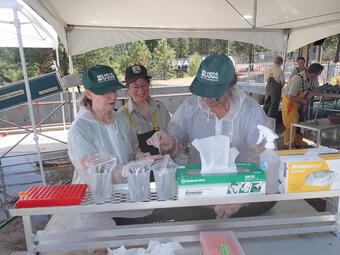For more than five decades the WFRC Fish Health Program has worked with partners to provide research findings to managers of aquatic resources. Those partners form a network of colleagues, co-investigators, and customers. Our partners include Department of the Interior bureaus, tribal and state fisheries agencies, other federal partners and the private sector.

The Fish Health Program has a strong commitment to provide prompt and thorough technical assistance to these partners in the form of reference laboratory services, education and training, hosting workshops, technology transfer, and rapid response concerning emerging fish diseases and other health issues. Previous research projects included identification of novel infectious agents, development of new diagnostic methods for emerging diseases, or short-term and tactical research to address emerging management issues. Many partnerships are formalized through contracts, cooperative agreements, interagency agreements, or memoranda, but they also can be informal. In-kind contributions toward research, collaboration on publications and workshops, and service on graduate student committees are some of the ways that informal partnerships are formed.
For more than five decades the WFRC Fish Health Program has worked with partners to provide research findings to managers of aquatic resources. Those partners form a network of colleagues, co-investigators, and customers. Our partners include Department of the Interior bureaus, tribal and state fisheries agencies, other federal partners and the private sector.

The Fish Health Program has a strong commitment to provide prompt and thorough technical assistance to these partners in the form of reference laboratory services, education and training, hosting workshops, technology transfer, and rapid response concerning emerging fish diseases and other health issues. Previous research projects included identification of novel infectious agents, development of new diagnostic methods for emerging diseases, or short-term and tactical research to address emerging management issues. Many partnerships are formalized through contracts, cooperative agreements, interagency agreements, or memoranda, but they also can be informal. In-kind contributions toward research, collaboration on publications and workshops, and service on graduate student committees are some of the ways that informal partnerships are formed.

